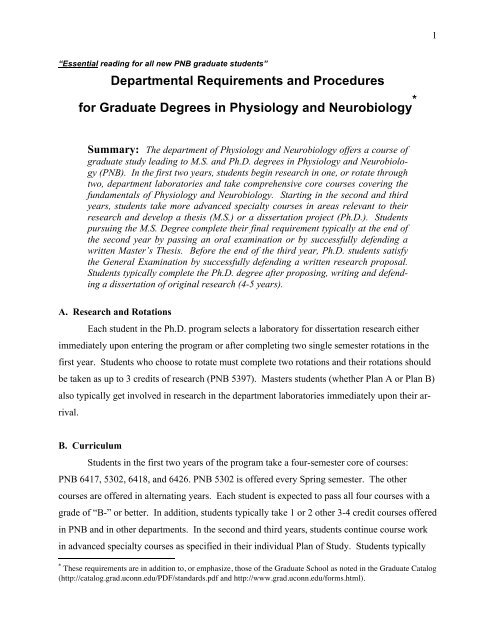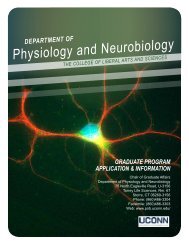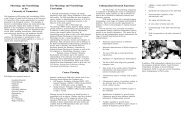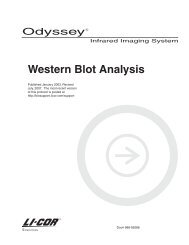Graduate Program Guidelines - Physiology and Neurobiology ...
Graduate Program Guidelines - Physiology and Neurobiology ...
Graduate Program Guidelines - Physiology and Neurobiology ...
You also want an ePaper? Increase the reach of your titles
YUMPU automatically turns print PDFs into web optimized ePapers that Google loves.
1“Essential reading for all new PNB graduate students”Departmental Requirements <strong>and</strong> Proceduresfor <strong>Graduate</strong> Degrees in <strong>Physiology</strong> <strong>and</strong> <strong>Neurobiology</strong> *Summary: The department of <strong>Physiology</strong> <strong>and</strong> <strong>Neurobiology</strong> offers a course ofgraduate study leading to M.S. <strong>and</strong> Ph.D. degrees in <strong>Physiology</strong> <strong>and</strong> <strong>Neurobiology</strong>(PNB). In the first two years, students begin research in one, or rotate throughtwo, department laboratories <strong>and</strong> take comprehensive core courses covering thefundamentals of <strong>Physiology</strong> <strong>and</strong> <strong>Neurobiology</strong>. Starting in the second <strong>and</strong> thirdyears, students take more advanced specialty courses in areas relevant to theirresearch <strong>and</strong> develop a thesis (M.S.) or a dissertation project (Ph.D.). Studentspursuing the M.S. Degree complete their final requirement typically at the end ofthe second year by passing an oral examination or by successfully defending awritten Master’s Thesis. Before the end of the third year, Ph.D. students satisfythe General Examination by successfully defending a written research proposal.Students typically complete the Ph.D. degree after proposing, writing <strong>and</strong> defendinga dissertation of original research (4-5 years).A. Research <strong>and</strong> RotationsEach student in the Ph.D. program selects a laboratory for dissertation research eitherimmediately upon entering the program or after completing two single semester rotations in thefirst year. Students who choose to rotate must complete two rotations <strong>and</strong> their rotations shouldbe taken as up to 3 credits of research (PNB 5397). Masters students (whether Plan A or Plan B)also typically get involved in research in the department laboratories immediately upon their arrival.B. CurriculumStudents in the first two years of the program take a four-semester core of courses:PNB 6417, 5302, 6418, <strong>and</strong> 6426. PNB 5302 is offered every Spring semester. The othercourses are offered in alternating years. Each student is expected to pass all four courses with agrade of “B-” or better. In addition, students typically take 1 or 2 other 3-4 credit courses offeredin PNB <strong>and</strong> in other departments. In the second <strong>and</strong> third years, students continue course workin advanced specialty courses as specified in their individual Plan of Study. Students typically* These requirements are in addition to, or emphasize, those of the <strong>Graduate</strong> School as noted in the <strong>Graduate</strong> Catalog(http://catalog.grad.uconn.edu/PDF/st<strong>and</strong>ards.pdf <strong>and</strong> http://www.grad.uconn.edu/forms.html).





